Comprehensive Research Report: Covid-19 Impact on UK Tourism Industry
VerifiedAdded on 2022/11/30
|12
|2718
|140
Report
AI Summary
This report investigates the impact of Covid-19 on the travel and tourism industry in the UK. It begins with an executive summary and outlines the aim, objectives, and methodologies employed, which include both qualitative and quantitative research approaches, primary and secondary data collection methods (questionnaires, articles, books). The report emphasizes ethical considerations, ensuring respect for autonomy, privacy, and dignity, maintaining scientific integrity, promoting social responsibility, and maximizing benefits while minimizing harm. The methodology section details research philosophies (positivism, interpretivism), approaches (deductive), strategies (survey), and choices (qualitative and quantitative). Data collection methods, including questionnaires and secondary sources like peer-reviewed articles, are described. The sampling strategy involves selecting employees and managers from the tourism industry using probability sampling. The report concludes with a research ethics checklist and references. The study aims to identify the impact of Covid-19 on the tourism industry in the UK.
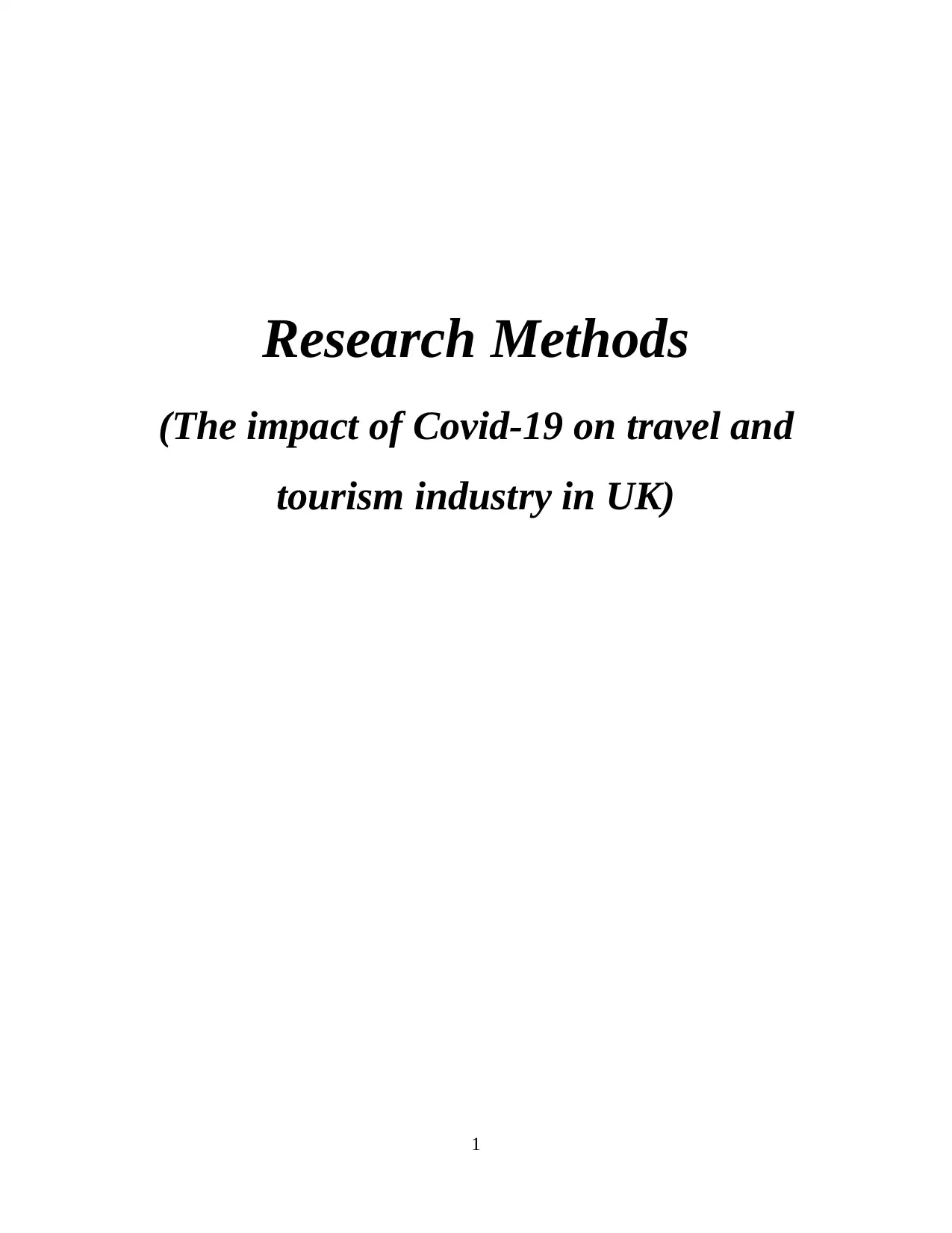
Research Methods
(The impact of Covid-19 on travel and
tourism industry in UK)
1
(The impact of Covid-19 on travel and
tourism industry in UK)
1
Paraphrase This Document
Need a fresh take? Get an instant paraphrase of this document with our AI Paraphraser
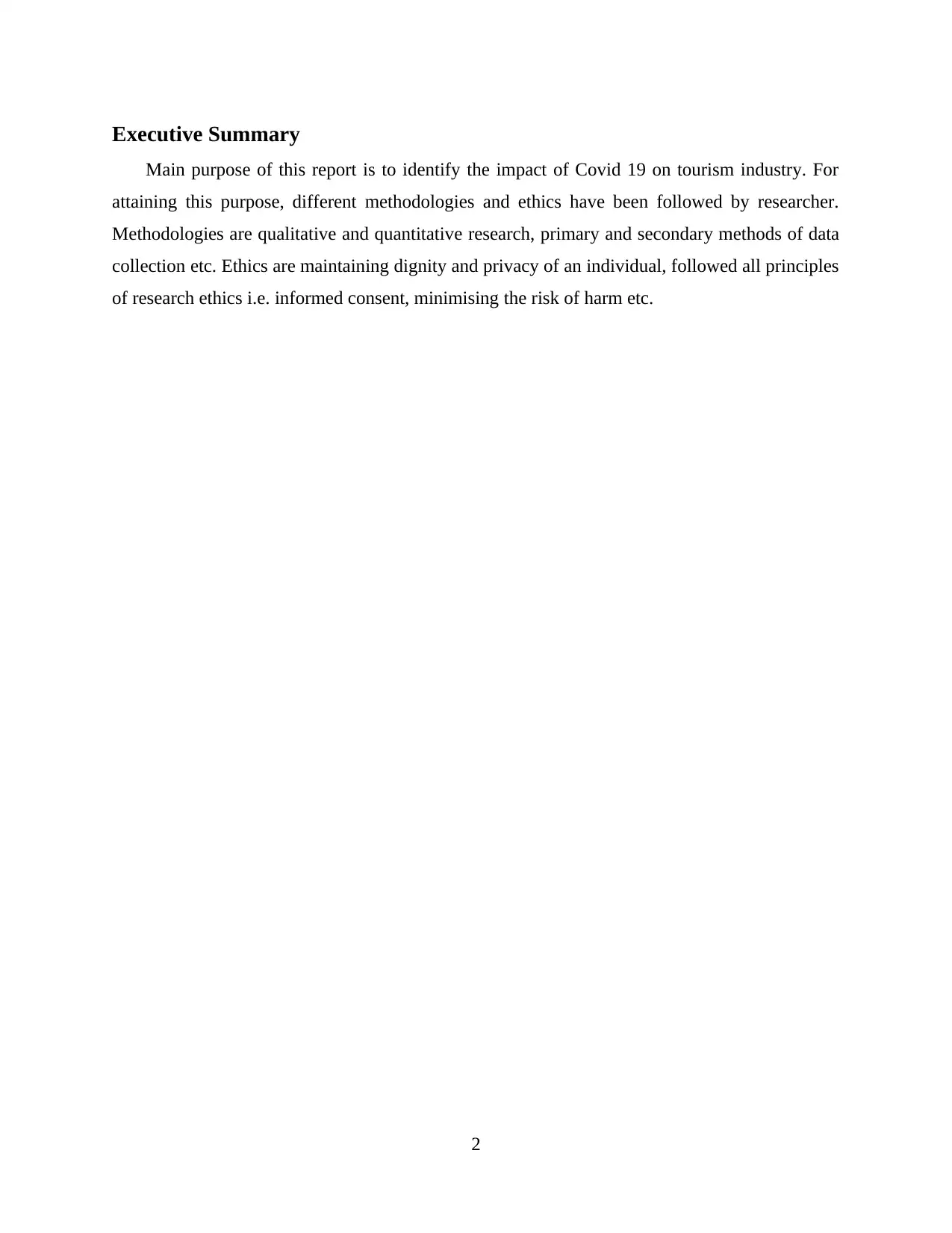
Executive Summary
Main purpose of this report is to identify the impact of Covid 19 on tourism industry. For
attaining this purpose, different methodologies and ethics have been followed by researcher.
Methodologies are qualitative and quantitative research, primary and secondary methods of data
collection etc. Ethics are maintaining dignity and privacy of an individual, followed all principles
of research ethics i.e. informed consent, minimising the risk of harm etc.
2
Main purpose of this report is to identify the impact of Covid 19 on tourism industry. For
attaining this purpose, different methodologies and ethics have been followed by researcher.
Methodologies are qualitative and quantitative research, primary and secondary methods of data
collection etc. Ethics are maintaining dignity and privacy of an individual, followed all principles
of research ethics i.e. informed consent, minimising the risk of harm etc.
2
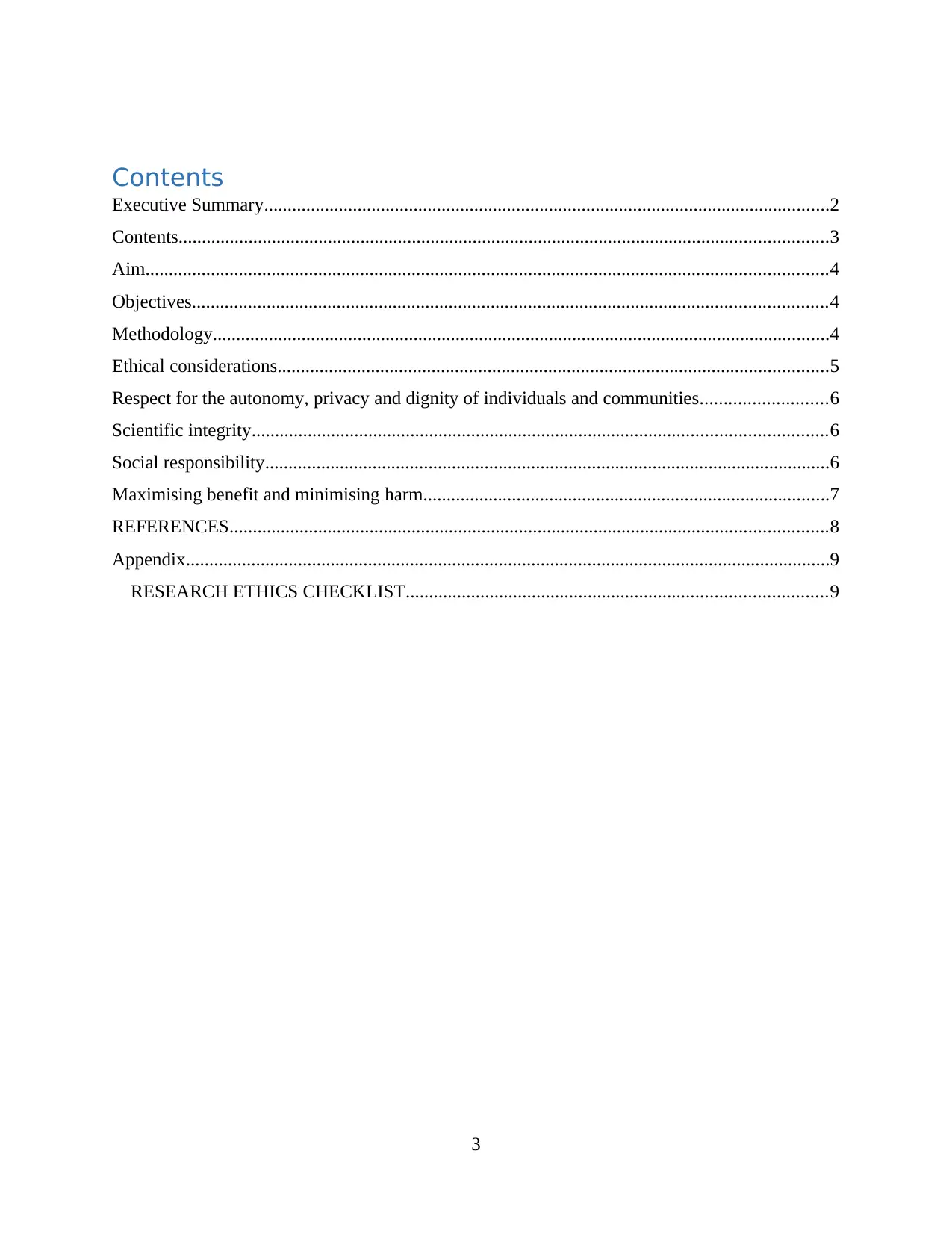
Contents
Executive Summary.........................................................................................................................2
Contents...........................................................................................................................................3
Aim..................................................................................................................................................4
Objectives........................................................................................................................................4
Methodology....................................................................................................................................4
Ethical considerations......................................................................................................................5
Respect for the autonomy, privacy and dignity of individuals and communities...........................6
Scientific integrity...........................................................................................................................6
Social responsibility.........................................................................................................................6
Maximising benefit and minimising harm.......................................................................................7
REFERENCES................................................................................................................................8
Appendix..........................................................................................................................................9
RESEARCH ETHICS CHECKLIST..........................................................................................9
3
Executive Summary.........................................................................................................................2
Contents...........................................................................................................................................3
Aim..................................................................................................................................................4
Objectives........................................................................................................................................4
Methodology....................................................................................................................................4
Ethical considerations......................................................................................................................5
Respect for the autonomy, privacy and dignity of individuals and communities...........................6
Scientific integrity...........................................................................................................................6
Social responsibility.........................................................................................................................6
Maximising benefit and minimising harm.......................................................................................7
REFERENCES................................................................................................................................8
Appendix..........................................................................................................................................9
RESEARCH ETHICS CHECKLIST..........................................................................................9
3
⊘ This is a preview!⊘
Do you want full access?
Subscribe today to unlock all pages.

Trusted by 1+ million students worldwide
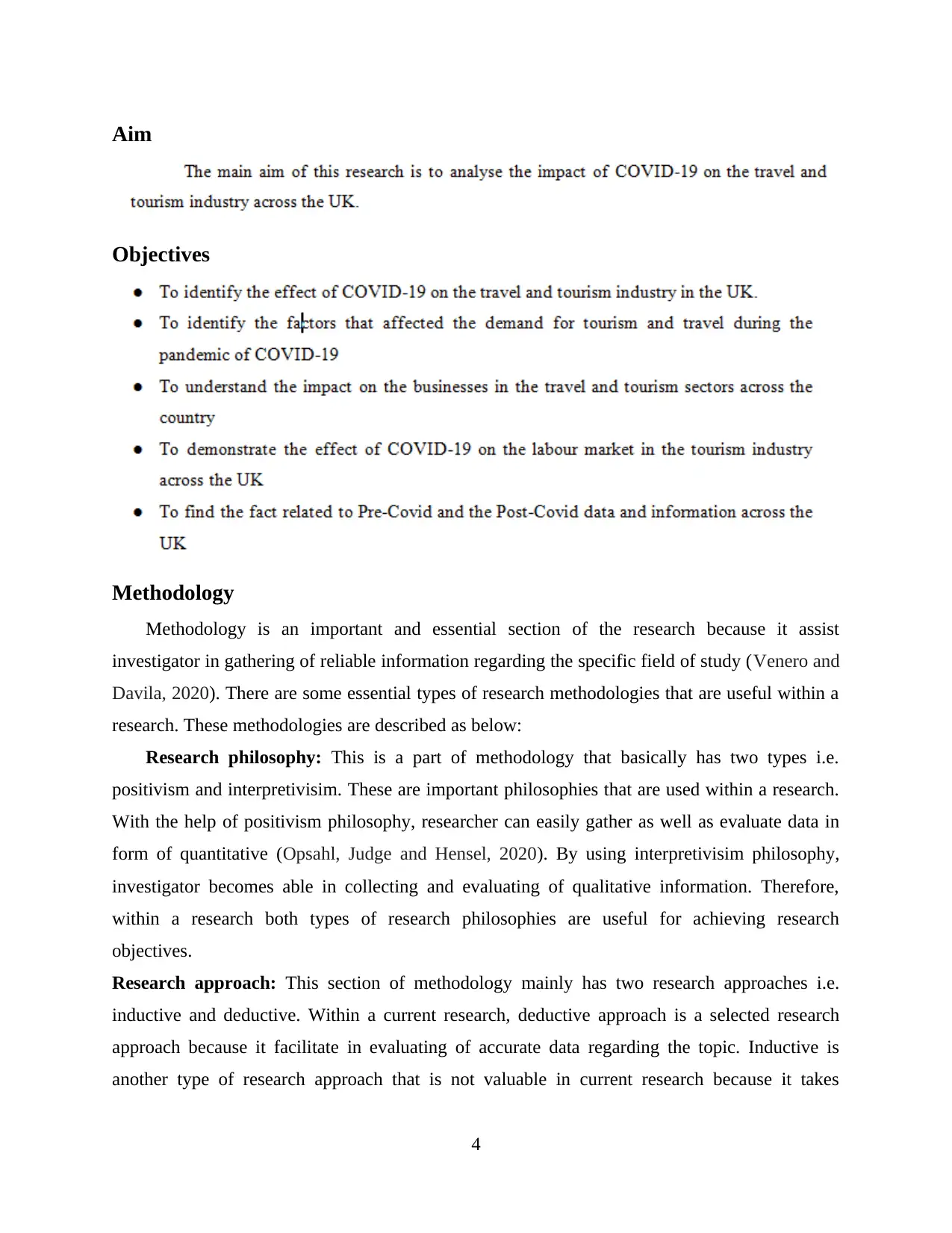
Aim
Objectives
Methodology
Methodology is an important and essential section of the research because it assist
investigator in gathering of reliable information regarding the specific field of study (Venero and
Davila, 2020). There are some essential types of research methodologies that are useful within a
research. These methodologies are described as below:
Research philosophy: This is a part of methodology that basically has two types i.e.
positivism and interpretivisim. These are important philosophies that are used within a research.
With the help of positivism philosophy, researcher can easily gather as well as evaluate data in
form of quantitative (Opsahl, Judge and Hensel, 2020). By using interpretivisim philosophy,
investigator becomes able in collecting and evaluating of qualitative information. Therefore,
within a research both types of research philosophies are useful for achieving research
objectives.
Research approach: This section of methodology mainly has two research approaches i.e.
inductive and deductive. Within a current research, deductive approach is a selected research
approach because it facilitate in evaluating of accurate data regarding the topic. Inductive is
another type of research approach that is not valuable in current research because it takes
4
Objectives
Methodology
Methodology is an important and essential section of the research because it assist
investigator in gathering of reliable information regarding the specific field of study (Venero and
Davila, 2020). There are some essential types of research methodologies that are useful within a
research. These methodologies are described as below:
Research philosophy: This is a part of methodology that basically has two types i.e.
positivism and interpretivisim. These are important philosophies that are used within a research.
With the help of positivism philosophy, researcher can easily gather as well as evaluate data in
form of quantitative (Opsahl, Judge and Hensel, 2020). By using interpretivisim philosophy,
investigator becomes able in collecting and evaluating of qualitative information. Therefore,
within a research both types of research philosophies are useful for achieving research
objectives.
Research approach: This section of methodology mainly has two research approaches i.e.
inductive and deductive. Within a current research, deductive approach is a selected research
approach because it facilitate in evaluating of accurate data regarding the topic. Inductive is
another type of research approach that is not valuable in current research because it takes
4
Paraphrase This Document
Need a fresh take? Get an instant paraphrase of this document with our AI Paraphraser
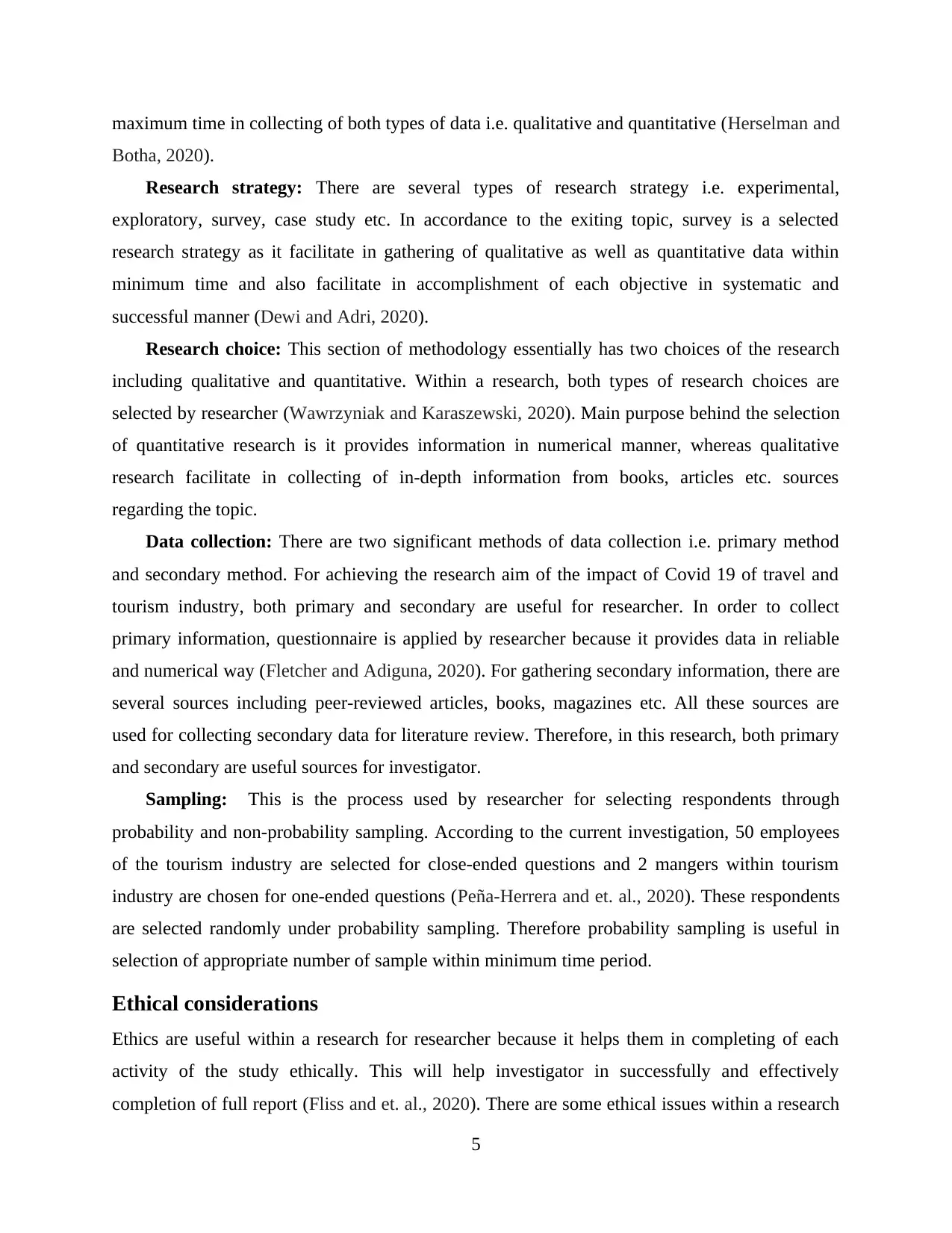
maximum time in collecting of both types of data i.e. qualitative and quantitative (Herselman and
Botha, 2020).
Research strategy: There are several types of research strategy i.e. experimental,
exploratory, survey, case study etc. In accordance to the exiting topic, survey is a selected
research strategy as it facilitate in gathering of qualitative as well as quantitative data within
minimum time and also facilitate in accomplishment of each objective in systematic and
successful manner (Dewi and Adri, 2020).
Research choice: This section of methodology essentially has two choices of the research
including qualitative and quantitative. Within a research, both types of research choices are
selected by researcher (Wawrzyniak and Karaszewski, 2020). Main purpose behind the selection
of quantitative research is it provides information in numerical manner, whereas qualitative
research facilitate in collecting of in-depth information from books, articles etc. sources
regarding the topic.
Data collection: There are two significant methods of data collection i.e. primary method
and secondary method. For achieving the research aim of the impact of Covid 19 of travel and
tourism industry, both primary and secondary are useful for researcher. In order to collect
primary information, questionnaire is applied by researcher because it provides data in reliable
and numerical way (Fletcher and Adiguna, 2020). For gathering secondary information, there are
several sources including peer-reviewed articles, books, magazines etc. All these sources are
used for collecting secondary data for literature review. Therefore, in this research, both primary
and secondary are useful sources for investigator.
Sampling: This is the process used by researcher for selecting respondents through
probability and non-probability sampling. According to the current investigation, 50 employees
of the tourism industry are selected for close-ended questions and 2 mangers within tourism
industry are chosen for one-ended questions (Peña-Herrera and et. al., 2020). These respondents
are selected randomly under probability sampling. Therefore probability sampling is useful in
selection of appropriate number of sample within minimum time period.
Ethical considerations
Ethics are useful within a research for researcher because it helps them in completing of each
activity of the study ethically. This will help investigator in successfully and effectively
completion of full report (Fliss and et. al., 2020). There are some ethical issues within a research
5
Botha, 2020).
Research strategy: There are several types of research strategy i.e. experimental,
exploratory, survey, case study etc. In accordance to the exiting topic, survey is a selected
research strategy as it facilitate in gathering of qualitative as well as quantitative data within
minimum time and also facilitate in accomplishment of each objective in systematic and
successful manner (Dewi and Adri, 2020).
Research choice: This section of methodology essentially has two choices of the research
including qualitative and quantitative. Within a research, both types of research choices are
selected by researcher (Wawrzyniak and Karaszewski, 2020). Main purpose behind the selection
of quantitative research is it provides information in numerical manner, whereas qualitative
research facilitate in collecting of in-depth information from books, articles etc. sources
regarding the topic.
Data collection: There are two significant methods of data collection i.e. primary method
and secondary method. For achieving the research aim of the impact of Covid 19 of travel and
tourism industry, both primary and secondary are useful for researcher. In order to collect
primary information, questionnaire is applied by researcher because it provides data in reliable
and numerical way (Fletcher and Adiguna, 2020). For gathering secondary information, there are
several sources including peer-reviewed articles, books, magazines etc. All these sources are
used for collecting secondary data for literature review. Therefore, in this research, both primary
and secondary are useful sources for investigator.
Sampling: This is the process used by researcher for selecting respondents through
probability and non-probability sampling. According to the current investigation, 50 employees
of the tourism industry are selected for close-ended questions and 2 mangers within tourism
industry are chosen for one-ended questions (Peña-Herrera and et. al., 2020). These respondents
are selected randomly under probability sampling. Therefore probability sampling is useful in
selection of appropriate number of sample within minimum time period.
Ethical considerations
Ethics are useful within a research for researcher because it helps them in completing of each
activity of the study ethically. This will help investigator in successfully and effectively
completion of full report (Fliss and et. al., 2020). There are some ethical issues within a research
5
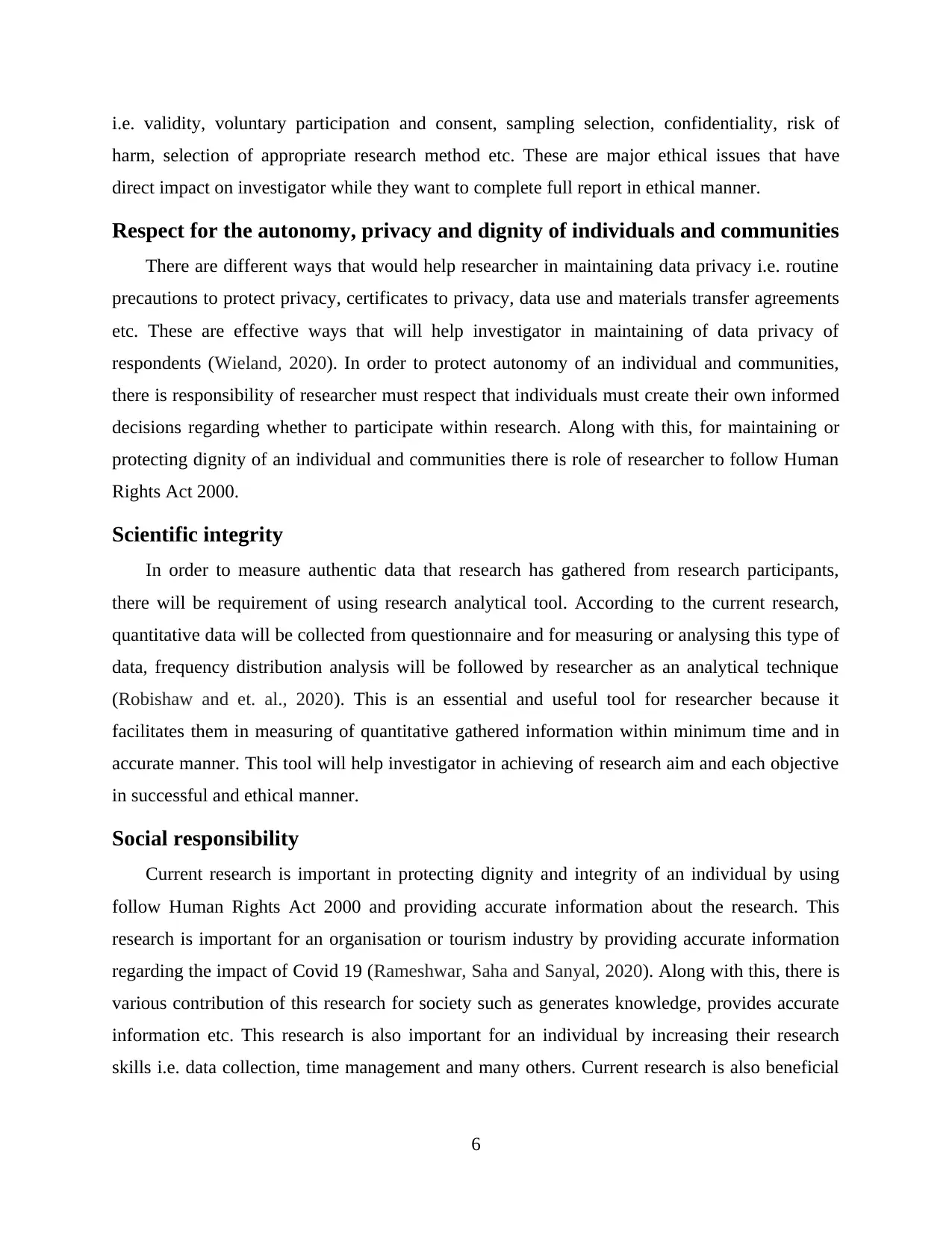
i.e. validity, voluntary participation and consent, sampling selection, confidentiality, risk of
harm, selection of appropriate research method etc. These are major ethical issues that have
direct impact on investigator while they want to complete full report in ethical manner.
Respect for the autonomy, privacy and dignity of individuals and communities
There are different ways that would help researcher in maintaining data privacy i.e. routine
precautions to protect privacy, certificates to privacy, data use and materials transfer agreements
etc. These are effective ways that will help investigator in maintaining of data privacy of
respondents (Wieland, 2020). In order to protect autonomy of an individual and communities,
there is responsibility of researcher must respect that individuals must create their own informed
decisions regarding whether to participate within research. Along with this, for maintaining or
protecting dignity of an individual and communities there is role of researcher to follow Human
Rights Act 2000.
Scientific integrity
In order to measure authentic data that research has gathered from research participants,
there will be requirement of using research analytical tool. According to the current research,
quantitative data will be collected from questionnaire and for measuring or analysing this type of
data, frequency distribution analysis will be followed by researcher as an analytical technique
(Robishaw and et. al., 2020). This is an essential and useful tool for researcher because it
facilitates them in measuring of quantitative gathered information within minimum time and in
accurate manner. This tool will help investigator in achieving of research aim and each objective
in successful and ethical manner.
Social responsibility
Current research is important in protecting dignity and integrity of an individual by using
follow Human Rights Act 2000 and providing accurate information about the research. This
research is important for an organisation or tourism industry by providing accurate information
regarding the impact of Covid 19 (Rameshwar, Saha and Sanyal, 2020). Along with this, there is
various contribution of this research for society such as generates knowledge, provides accurate
information etc. This research is also important for an individual by increasing their research
skills i.e. data collection, time management and many others. Current research is also beneficial
6
harm, selection of appropriate research method etc. These are major ethical issues that have
direct impact on investigator while they want to complete full report in ethical manner.
Respect for the autonomy, privacy and dignity of individuals and communities
There are different ways that would help researcher in maintaining data privacy i.e. routine
precautions to protect privacy, certificates to privacy, data use and materials transfer agreements
etc. These are effective ways that will help investigator in maintaining of data privacy of
respondents (Wieland, 2020). In order to protect autonomy of an individual and communities,
there is responsibility of researcher must respect that individuals must create their own informed
decisions regarding whether to participate within research. Along with this, for maintaining or
protecting dignity of an individual and communities there is role of researcher to follow Human
Rights Act 2000.
Scientific integrity
In order to measure authentic data that research has gathered from research participants,
there will be requirement of using research analytical tool. According to the current research,
quantitative data will be collected from questionnaire and for measuring or analysing this type of
data, frequency distribution analysis will be followed by researcher as an analytical technique
(Robishaw and et. al., 2020). This is an essential and useful tool for researcher because it
facilitates them in measuring of quantitative gathered information within minimum time and in
accurate manner. This tool will help investigator in achieving of research aim and each objective
in successful and ethical manner.
Social responsibility
Current research is important in protecting dignity and integrity of an individual by using
follow Human Rights Act 2000 and providing accurate information about the research. This
research is important for an organisation or tourism industry by providing accurate information
regarding the impact of Covid 19 (Rameshwar, Saha and Sanyal, 2020). Along with this, there is
various contribution of this research for society such as generates knowledge, provides accurate
information etc. This research is also important for an individual by increasing their research
skills i.e. data collection, time management and many others. Current research is also beneficial
6
⊘ This is a preview!⊘
Do you want full access?
Subscribe today to unlock all pages.

Trusted by 1+ million students worldwide
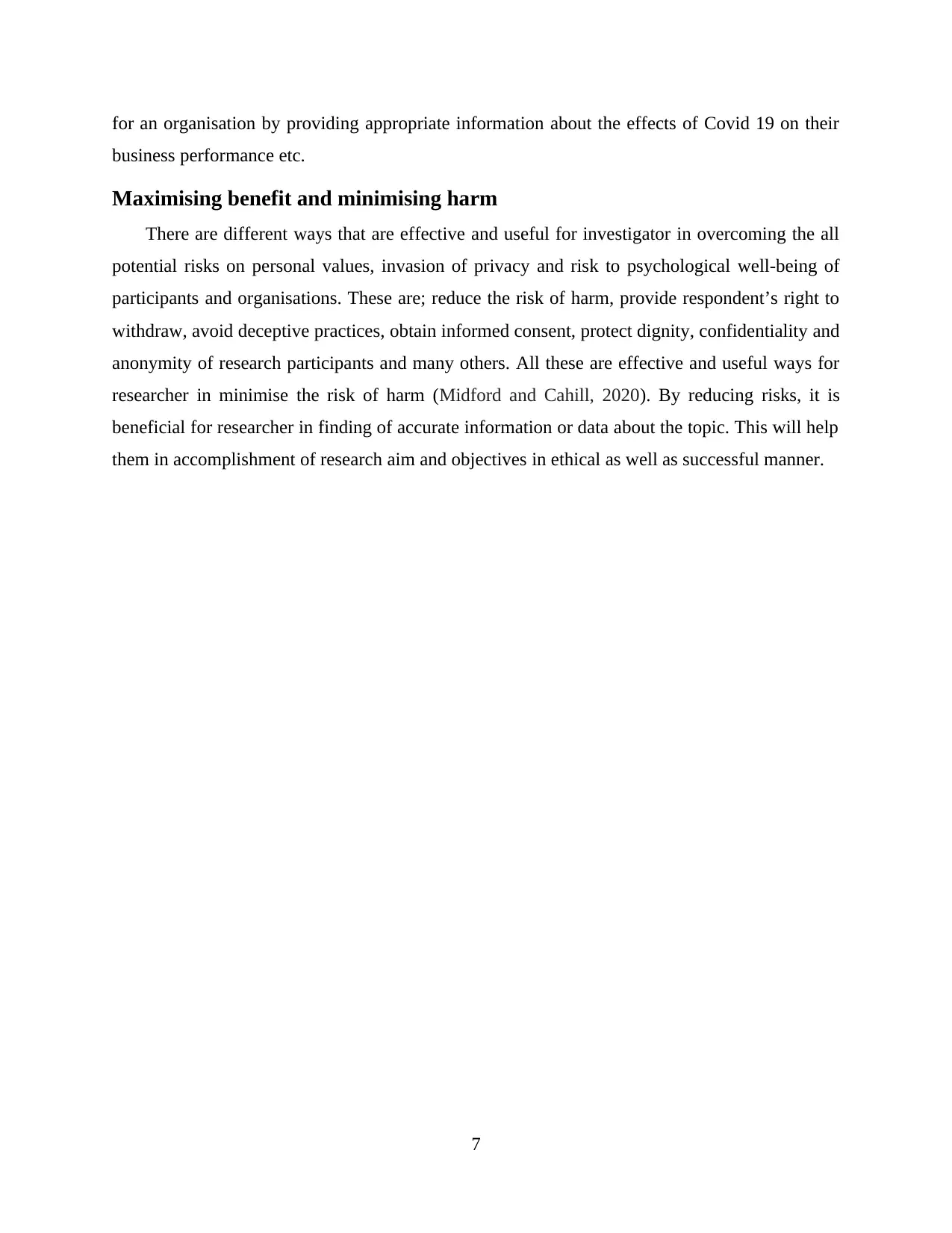
for an organisation by providing appropriate information about the effects of Covid 19 on their
business performance etc.
Maximising benefit and minimising harm
There are different ways that are effective and useful for investigator in overcoming the all
potential risks on personal values, invasion of privacy and risk to psychological well-being of
participants and organisations. These are; reduce the risk of harm, provide respondent’s right to
withdraw, avoid deceptive practices, obtain informed consent, protect dignity, confidentiality and
anonymity of research participants and many others. All these are effective and useful ways for
researcher in minimise the risk of harm (Midford and Cahill, 2020). By reducing risks, it is
beneficial for researcher in finding of accurate information or data about the topic. This will help
them in accomplishment of research aim and objectives in ethical as well as successful manner.
7
business performance etc.
Maximising benefit and minimising harm
There are different ways that are effective and useful for investigator in overcoming the all
potential risks on personal values, invasion of privacy and risk to psychological well-being of
participants and organisations. These are; reduce the risk of harm, provide respondent’s right to
withdraw, avoid deceptive practices, obtain informed consent, protect dignity, confidentiality and
anonymity of research participants and many others. All these are effective and useful ways for
researcher in minimise the risk of harm (Midford and Cahill, 2020). By reducing risks, it is
beneficial for researcher in finding of accurate information or data about the topic. This will help
them in accomplishment of research aim and objectives in ethical as well as successful manner.
7
Paraphrase This Document
Need a fresh take? Get an instant paraphrase of this document with our AI Paraphraser
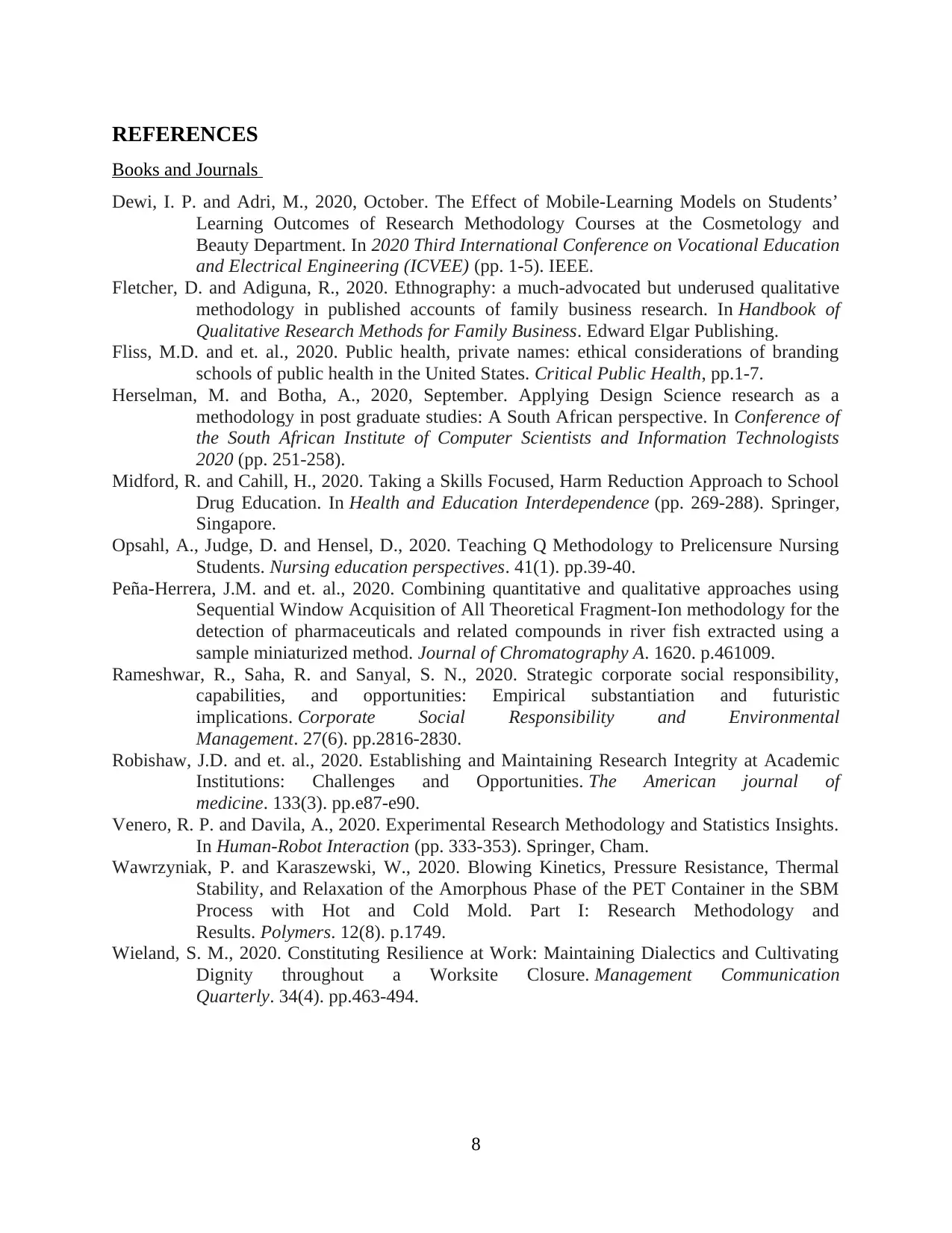
REFERENCES
Books and Journals
Dewi, I. P. and Adri, M., 2020, October. The Effect of Mobile-Learning Models on Students’
Learning Outcomes of Research Methodology Courses at the Cosmetology and
Beauty Department. In 2020 Third International Conference on Vocational Education
and Electrical Engineering (ICVEE) (pp. 1-5). IEEE.
Fletcher, D. and Adiguna, R., 2020. Ethnography: a much-advocated but underused qualitative
methodology in published accounts of family business research. In Handbook of
Qualitative Research Methods for Family Business. Edward Elgar Publishing.
Fliss, M.D. and et. al., 2020. Public health, private names: ethical considerations of branding
schools of public health in the United States. Critical Public Health, pp.1-7.
Herselman, M. and Botha, A., 2020, September. Applying Design Science research as a
methodology in post graduate studies: A South African perspective. In Conference of
the South African Institute of Computer Scientists and Information Technologists
2020 (pp. 251-258).
Midford, R. and Cahill, H., 2020. Taking a Skills Focused, Harm Reduction Approach to School
Drug Education. In Health and Education Interdependence (pp. 269-288). Springer,
Singapore.
Opsahl, A., Judge, D. and Hensel, D., 2020. Teaching Q Methodology to Prelicensure Nursing
Students. Nursing education perspectives. 41(1). pp.39-40.
Peña-Herrera, J.M. and et. al., 2020. Combining quantitative and qualitative approaches using
Sequential Window Acquisition of All Theoretical Fragment-Ion methodology for the
detection of pharmaceuticals and related compounds in river fish extracted using a
sample miniaturized method. Journal of Chromatography A. 1620. p.461009.
Rameshwar, R., Saha, R. and Sanyal, S. N., 2020. Strategic corporate social responsibility,
capabilities, and opportunities: Empirical substantiation and futuristic
implications. Corporate Social Responsibility and Environmental
Management. 27(6). pp.2816-2830.
Robishaw, J.D. and et. al., 2020. Establishing and Maintaining Research Integrity at Academic
Institutions: Challenges and Opportunities. The American journal of
medicine. 133(3). pp.e87-e90.
Venero, R. P. and Davila, A., 2020. Experimental Research Methodology and Statistics Insights.
In Human-Robot Interaction (pp. 333-353). Springer, Cham.
Wawrzyniak, P. and Karaszewski, W., 2020. Blowing Kinetics, Pressure Resistance, Thermal
Stability, and Relaxation of the Amorphous Phase of the PET Container in the SBM
Process with Hot and Cold Mold. Part I: Research Methodology and
Results. Polymers. 12(8). p.1749.
Wieland, S. M., 2020. Constituting Resilience at Work: Maintaining Dialectics and Cultivating
Dignity throughout a Worksite Closure. Management Communication
Quarterly. 34(4). pp.463-494.
8
Books and Journals
Dewi, I. P. and Adri, M., 2020, October. The Effect of Mobile-Learning Models on Students’
Learning Outcomes of Research Methodology Courses at the Cosmetology and
Beauty Department. In 2020 Third International Conference on Vocational Education
and Electrical Engineering (ICVEE) (pp. 1-5). IEEE.
Fletcher, D. and Adiguna, R., 2020. Ethnography: a much-advocated but underused qualitative
methodology in published accounts of family business research. In Handbook of
Qualitative Research Methods for Family Business. Edward Elgar Publishing.
Fliss, M.D. and et. al., 2020. Public health, private names: ethical considerations of branding
schools of public health in the United States. Critical Public Health, pp.1-7.
Herselman, M. and Botha, A., 2020, September. Applying Design Science research as a
methodology in post graduate studies: A South African perspective. In Conference of
the South African Institute of Computer Scientists and Information Technologists
2020 (pp. 251-258).
Midford, R. and Cahill, H., 2020. Taking a Skills Focused, Harm Reduction Approach to School
Drug Education. In Health and Education Interdependence (pp. 269-288). Springer,
Singapore.
Opsahl, A., Judge, D. and Hensel, D., 2020. Teaching Q Methodology to Prelicensure Nursing
Students. Nursing education perspectives. 41(1). pp.39-40.
Peña-Herrera, J.M. and et. al., 2020. Combining quantitative and qualitative approaches using
Sequential Window Acquisition of All Theoretical Fragment-Ion methodology for the
detection of pharmaceuticals and related compounds in river fish extracted using a
sample miniaturized method. Journal of Chromatography A. 1620. p.461009.
Rameshwar, R., Saha, R. and Sanyal, S. N., 2020. Strategic corporate social responsibility,
capabilities, and opportunities: Empirical substantiation and futuristic
implications. Corporate Social Responsibility and Environmental
Management. 27(6). pp.2816-2830.
Robishaw, J.D. and et. al., 2020. Establishing and Maintaining Research Integrity at Academic
Institutions: Challenges and Opportunities. The American journal of
medicine. 133(3). pp.e87-e90.
Venero, R. P. and Davila, A., 2020. Experimental Research Methodology and Statistics Insights.
In Human-Robot Interaction (pp. 333-353). Springer, Cham.
Wawrzyniak, P. and Karaszewski, W., 2020. Blowing Kinetics, Pressure Resistance, Thermal
Stability, and Relaxation of the Amorphous Phase of the PET Container in the SBM
Process with Hot and Cold Mold. Part I: Research Methodology and
Results. Polymers. 12(8). p.1749.
Wieland, S. M., 2020. Constituting Resilience at Work: Maintaining Dialectics and Cultivating
Dignity throughout a Worksite Closure. Management Communication
Quarterly. 34(4). pp.463-494.
8
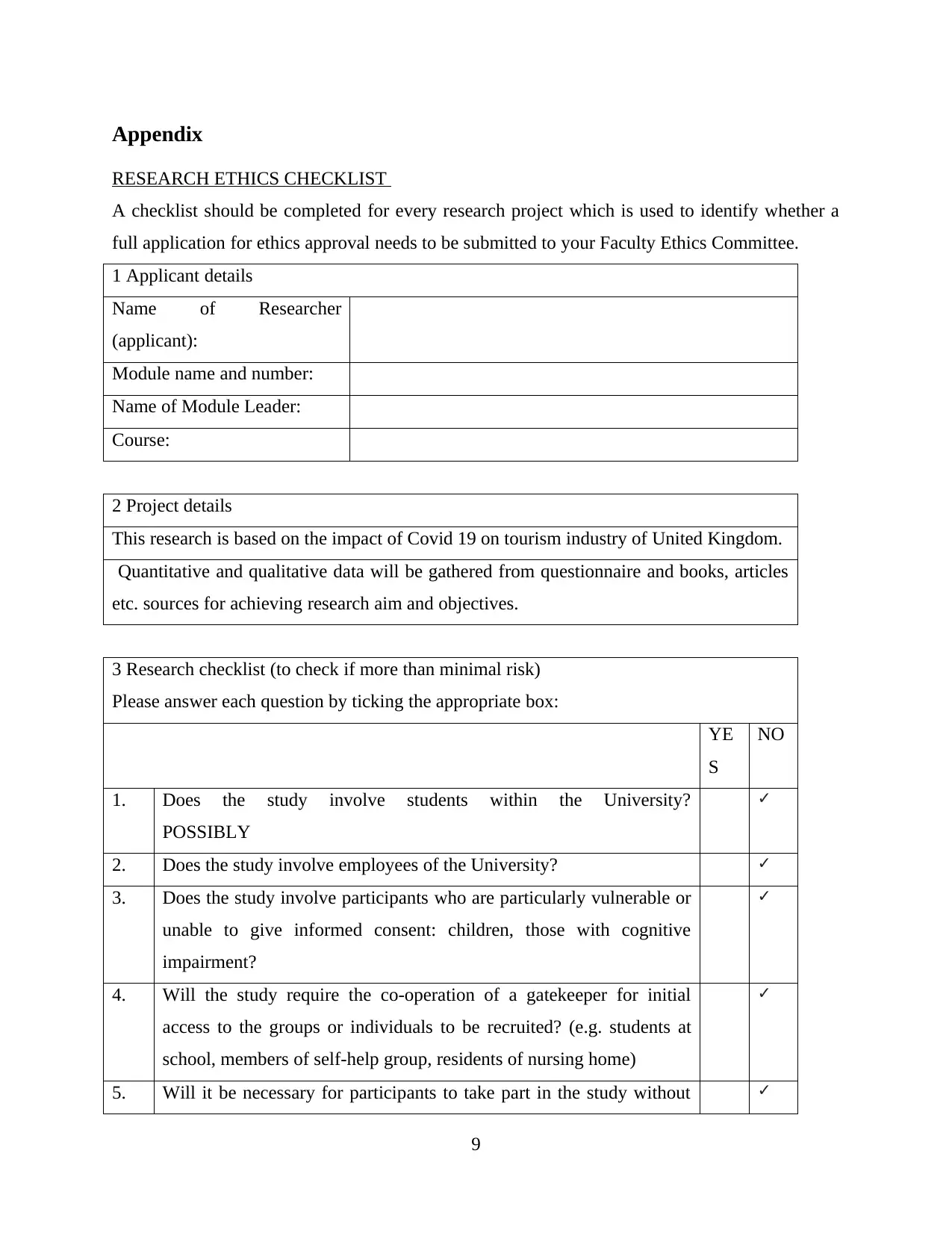
Appendix
RESEARCH ETHICS CHECKLIST
A checklist should be completed for every research project which is used to identify whether a
full application for ethics approval needs to be submitted to your Faculty Ethics Committee.
1 Applicant details
Name of Researcher
(applicant):
Module name and number:
Name of Module Leader:
Course:
2 Project details
This research is based on the impact of Covid 19 on tourism industry of United Kingdom.
Quantitative and qualitative data will be gathered from questionnaire and books, articles
etc. sources for achieving research aim and objectives.
3 Research checklist (to check if more than minimal risk)
Please answer each question by ticking the appropriate box:
YE
S
NO
1. Does the study involve students within the University?
POSSIBLY
✓
2. Does the study involve employees of the University? ✓
3. Does the study involve participants who are particularly vulnerable or
unable to give informed consent: children, those with cognitive
impairment?
✓
4. Will the study require the co-operation of a gatekeeper for initial
access to the groups or individuals to be recruited? (e.g. students at
school, members of self-help group, residents of nursing home)
✓
5. Will it be necessary for participants to take part in the study without ✓
9
RESEARCH ETHICS CHECKLIST
A checklist should be completed for every research project which is used to identify whether a
full application for ethics approval needs to be submitted to your Faculty Ethics Committee.
1 Applicant details
Name of Researcher
(applicant):
Module name and number:
Name of Module Leader:
Course:
2 Project details
This research is based on the impact of Covid 19 on tourism industry of United Kingdom.
Quantitative and qualitative data will be gathered from questionnaire and books, articles
etc. sources for achieving research aim and objectives.
3 Research checklist (to check if more than minimal risk)
Please answer each question by ticking the appropriate box:
YE
S
NO
1. Does the study involve students within the University?
POSSIBLY
✓
2. Does the study involve employees of the University? ✓
3. Does the study involve participants who are particularly vulnerable or
unable to give informed consent: children, those with cognitive
impairment?
✓
4. Will the study require the co-operation of a gatekeeper for initial
access to the groups or individuals to be recruited? (e.g. students at
school, members of self-help group, residents of nursing home)
✓
5. Will it be necessary for participants to take part in the study without ✓
9
⊘ This is a preview!⊘
Do you want full access?
Subscribe today to unlock all pages.

Trusted by 1+ million students worldwide
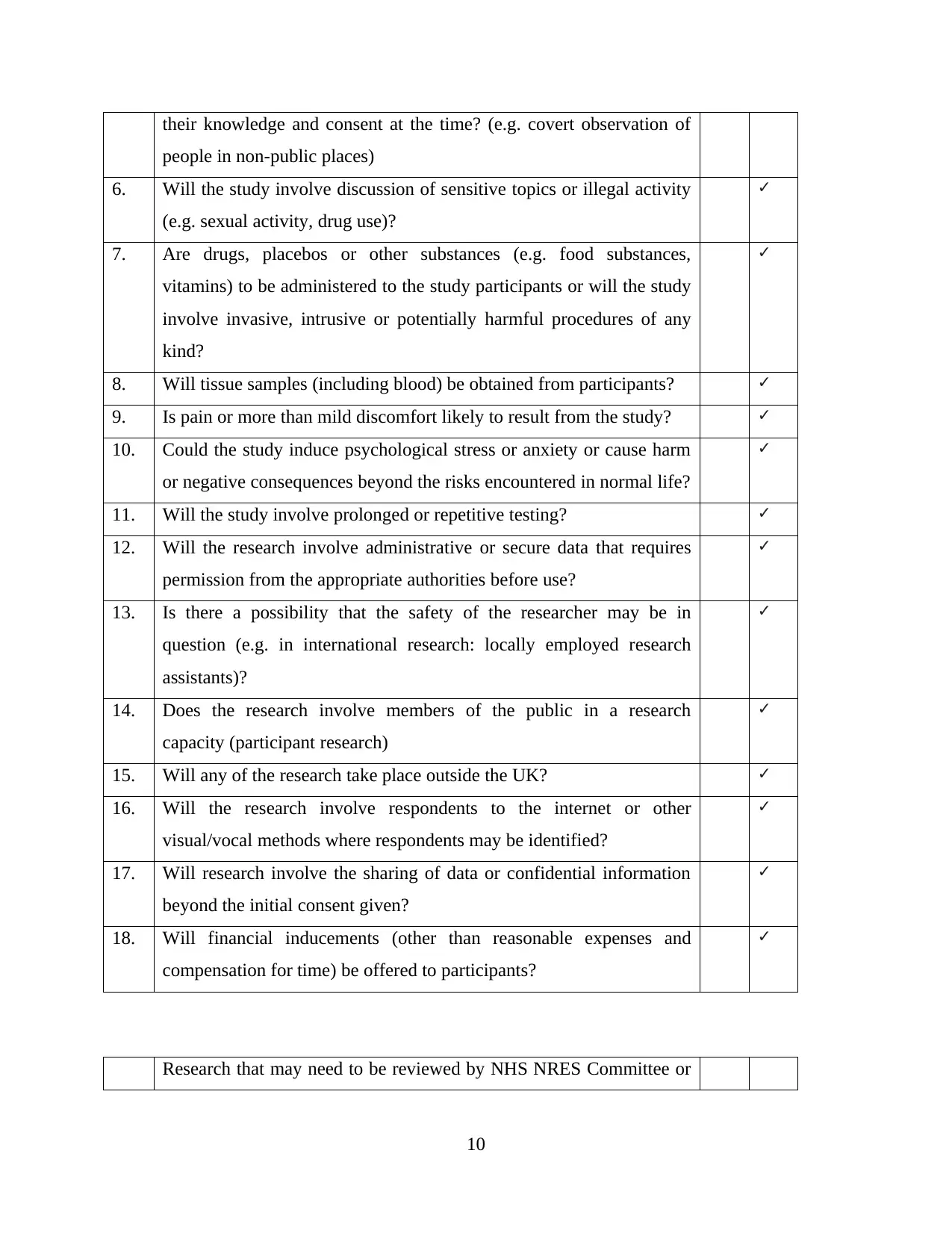
their knowledge and consent at the time? (e.g. covert observation of
people in non-public places)
6. Will the study involve discussion of sensitive topics or illegal activity
(e.g. sexual activity, drug use)?
✓
7. Are drugs, placebos or other substances (e.g. food substances,
vitamins) to be administered to the study participants or will the study
involve invasive, intrusive or potentially harmful procedures of any
kind?
✓
8. Will tissue samples (including blood) be obtained from participants? ✓
9. Is pain or more than mild discomfort likely to result from the study? ✓
10. Could the study induce psychological stress or anxiety or cause harm
or negative consequences beyond the risks encountered in normal life?
✓
11. Will the study involve prolonged or repetitive testing? ✓
12. Will the research involve administrative or secure data that requires
permission from the appropriate authorities before use?
✓
13. Is there a possibility that the safety of the researcher may be in
question (e.g. in international research: locally employed research
assistants)?
✓
14. Does the research involve members of the public in a research
capacity (participant research)
✓
15. Will any of the research take place outside the UK? ✓
16. Will the research involve respondents to the internet or other
visual/vocal methods where respondents may be identified?
✓
17. Will research involve the sharing of data or confidential information
beyond the initial consent given?
✓
18. Will financial inducements (other than reasonable expenses and
compensation for time) be offered to participants?
✓
Research that may need to be reviewed by NHS NRES Committee or
10
people in non-public places)
6. Will the study involve discussion of sensitive topics or illegal activity
(e.g. sexual activity, drug use)?
✓
7. Are drugs, placebos or other substances (e.g. food substances,
vitamins) to be administered to the study participants or will the study
involve invasive, intrusive or potentially harmful procedures of any
kind?
✓
8. Will tissue samples (including blood) be obtained from participants? ✓
9. Is pain or more than mild discomfort likely to result from the study? ✓
10. Could the study induce psychological stress or anxiety or cause harm
or negative consequences beyond the risks encountered in normal life?
✓
11. Will the study involve prolonged or repetitive testing? ✓
12. Will the research involve administrative or secure data that requires
permission from the appropriate authorities before use?
✓
13. Is there a possibility that the safety of the researcher may be in
question (e.g. in international research: locally employed research
assistants)?
✓
14. Does the research involve members of the public in a research
capacity (participant research)
✓
15. Will any of the research take place outside the UK? ✓
16. Will the research involve respondents to the internet or other
visual/vocal methods where respondents may be identified?
✓
17. Will research involve the sharing of data or confidential information
beyond the initial consent given?
✓
18. Will financial inducements (other than reasonable expenses and
compensation for time) be offered to participants?
✓
Research that may need to be reviewed by NHS NRES Committee or
10
Paraphrase This Document
Need a fresh take? Get an instant paraphrase of this document with our AI Paraphraser
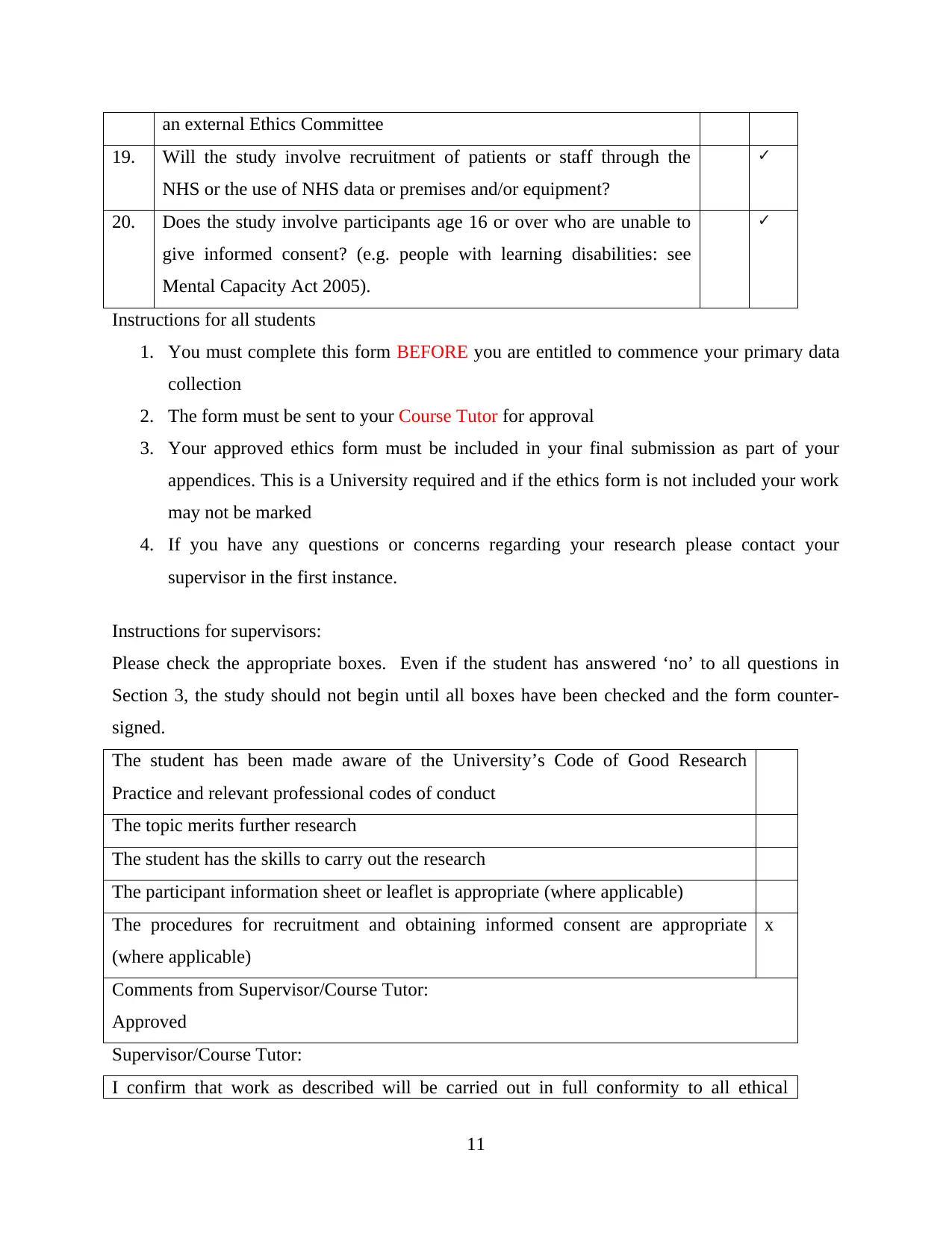
an external Ethics Committee
19. Will the study involve recruitment of patients or staff through the
NHS or the use of NHS data or premises and/or equipment?
✓
20. Does the study involve participants age 16 or over who are unable to
give informed consent? (e.g. people with learning disabilities: see
Mental Capacity Act 2005).
✓
Instructions for all students
1. You must complete this form BEFORE you are entitled to commence your primary data
collection
2. The form must be sent to your Course Tutor for approval
3. Your approved ethics form must be included in your final submission as part of your
appendices. This is a University required and if the ethics form is not included your work
may not be marked
4. If you have any questions or concerns regarding your research please contact your
supervisor in the first instance.
Instructions for supervisors:
Please check the appropriate boxes. Even if the student has answered ‘no’ to all questions in
Section 3, the study should not begin until all boxes have been checked and the form counter-
signed.
The student has been made aware of the University’s Code of Good Research
Practice and relevant professional codes of conduct
The topic merits further research
The student has the skills to carry out the research
The participant information sheet or leaflet is appropriate (where applicable)
The procedures for recruitment and obtaining informed consent are appropriate
(where applicable)
x
Comments from Supervisor/Course Tutor:
Approved
Supervisor/Course Tutor:
I confirm that work as described will be carried out in full conformity to all ethical
11
19. Will the study involve recruitment of patients or staff through the
NHS or the use of NHS data or premises and/or equipment?
✓
20. Does the study involve participants age 16 or over who are unable to
give informed consent? (e.g. people with learning disabilities: see
Mental Capacity Act 2005).
✓
Instructions for all students
1. You must complete this form BEFORE you are entitled to commence your primary data
collection
2. The form must be sent to your Course Tutor for approval
3. Your approved ethics form must be included in your final submission as part of your
appendices. This is a University required and if the ethics form is not included your work
may not be marked
4. If you have any questions or concerns regarding your research please contact your
supervisor in the first instance.
Instructions for supervisors:
Please check the appropriate boxes. Even if the student has answered ‘no’ to all questions in
Section 3, the study should not begin until all boxes have been checked and the form counter-
signed.
The student has been made aware of the University’s Code of Good Research
Practice and relevant professional codes of conduct
The topic merits further research
The student has the skills to carry out the research
The participant information sheet or leaflet is appropriate (where applicable)
The procedures for recruitment and obtaining informed consent are appropriate
(where applicable)
x
Comments from Supervisor/Course Tutor:
Approved
Supervisor/Course Tutor:
I confirm that work as described will be carried out in full conformity to all ethical
11
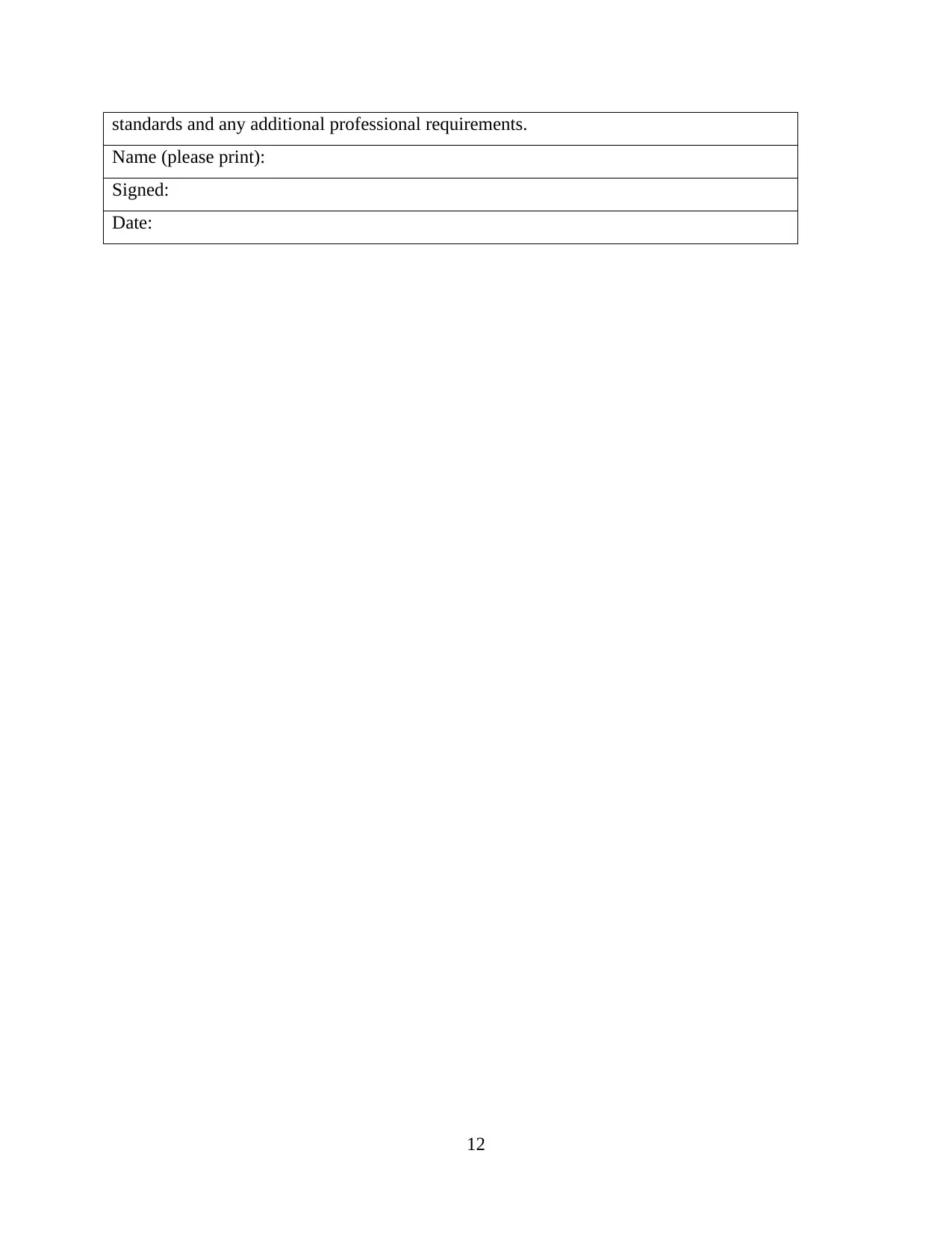
standards and any additional professional requirements.
Name (please print):
Signed:
Date:
12
Name (please print):
Signed:
Date:
12
⊘ This is a preview!⊘
Do you want full access?
Subscribe today to unlock all pages.

Trusted by 1+ million students worldwide
1 out of 12
Related Documents
Your All-in-One AI-Powered Toolkit for Academic Success.
+13062052269
info@desklib.com
Available 24*7 on WhatsApp / Email
![[object Object]](/_next/static/media/star-bottom.7253800d.svg)
Unlock your academic potential
Copyright © 2020–2026 A2Z Services. All Rights Reserved. Developed and managed by ZUCOL.





